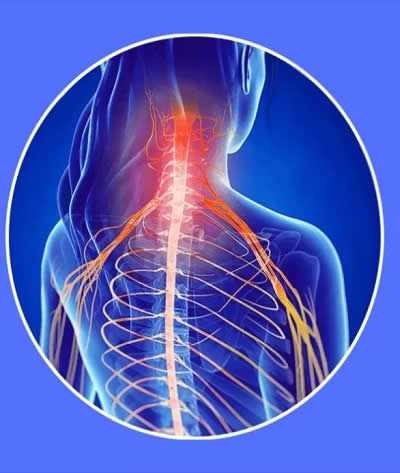Positive Health Online
Your Country

Which is Better: Heat or Ice for a Pinched Nerve?
by Dr Brent Wells DC(more info)
listed in back pain, originally published in issue 278 - May 2022
Acknowledgement Citation
https://betterhealthalaska.com/which-is-better-heat-or-ice-for-a-pinched-nerve/
You’ve probably used heat or ice before on a sprain or a sore muscle. But, if you have a pinched nerve, you know it’s a different feeling than a sprain or strain. So, you may be wondering which is better for a pinched nerve, heat or ice?

The answer is both. Using heat and ice for a pinched nerve is a good way to reduce swelling, promote fresh blood flow to the area, and relax the surrounding muscles that may be contributing to the pinched nerve. The trick is knowing when to use ice and when to use heat.
Heading to the chiropractor can help a pinched nerve, but many people like to use home remedies if the pain isn’t too bad. And the simplest home remedies are all about heat and ice. So, read on to discover how to use heat and ice for a pinched nerve.
Is it Okay to Put Heat on a Pinched Nerve?
Overall, it’s okay to put heat on a pinched nerve. However, there are times when ice is best, and other times when heat is most beneficial. The general rule of thumb for a pinched nerve is to use heat only after you’ve managed to get the pain to subside a little bit. When the pain first flares up, use ice or cold packs before you use heat. And don’t apply heat to the area directly after applying ice. You’ll want to wait 30 minutes to an hour at least.
For the best results, keep the heat on the affected area for 10 to 20 minutes at a time. Take a minimum 30-minute break between sessions. If you find that it’s helping, you can apply moderate heat to an area for up to an hour or more. Extended heat therapy is most beneficial for more severe pain from a pinched nerve. It’s almost like spending time in a hot tub – you can do it safely if it’s not too hot.
What Heat Does for a Pinched Nerve
When applied correctly, heat is very beneficial for a pinched nerve.
- Heat is soothing and relaxing— both for your muscles and your mind;
- Heat promotes healing by bringing new blood flow to the area, which brings healing properties and helps flush toxins away;
- You can decrease tension and spasms in the muscles by applying heat to the area;
- Using heat can also increase the range of motion in the joint.
Don’t Use Heat Therapy If…
It can be dangerous for some people with pre-existing conditions to use heat therapy. Conditions such as deep vein thrombosis, diabetes, vascular disease, and multiple sclerosis can make heat therapy dangerous. Consult a doctor if you’re unsure.
How Do You Put Ice on a Pinched Nerve?
Many people learn as kids that an ice pack (or a frozen bag of peas) is great for reducing pain and swelling. But, if ice is left on the skin for too long, it can cause damage. So, here are some things you can do to safely use ice on your pinched nerve.
- Keep the ice pack on for no longer than 15 minutes at a time;
- Take an hour break between ice pack sessions;
- Place a cloth or towel between the ice pack and the skin;
- Try an ice massage – applying ice directly to the skin of the affected area for 5 minutes at a time in circular, massaging motions.
How Does Ice Help a Pinched Nerve?
Ice or cold packs are the go-to for many different issues because the cold helps reduce pain and swelling. This is no different for pinched nerves.
- Ice relieves pain quickly by numbing the area;
- It reduces swelling by slowing blood flow to the area;
- Cools the muscle fibres, reducing muscle spasms.
Don’t Use an Ice Pack If…
Some people, especially those who have a hard time feeling pain, can damage their skin with an ice pack. Those who suffer from diabetes should use special care with an ice pack, as nerve damage is a side effect, making it hard for them to feel pain.
If you’re looking to relieve stiffness in joints or muscles, don’t use ice. Instead, use heat!

Can You Make a Pinched Nerve Worse?
You can make a pinched nerve worse in several different ways. So, now that we’ve covered how to use heat and ice therapy to make a pinched nerve better, let’s talk about things that can make a pinched nerve worse. Below are some examples of things to avoid when dealing with a pinched nerve.
- Lifting heavy things;
- Making sudden, jerking movements;
- Performing high-intensity or high-speed exercise;
- Playing contact sports;
- Sitting or laying too much (it’s good to move, just take it easy!);
- Avoiding the doctor if the pain persists.
Best Pinched Nerve Home Remedies and Preventions
Other than applying heat and ice, there are a few other home remedies and preventative measures you can try for a pinched nerve.
- Maintain a healthy posture;
- Maintain a healthy weight;
- Eat anti-inflammatory and whole foods;
- Get plenty of rest (7 to 8 hours of sleep a night!);
- Get a massage (from a professional);
- Try yoga or other gentle stretching techniques.
And of course, if home remedies don’t work and the pain persists, know when to visit a chiropractor. Doctors of chiropractic specialize in pinched nerves. The nervous system and the musculoskeletal system are intertwined, and chiropractors are trained to use different techniques to relieve the pressure on a pinched nerve. Some patients see relief after only one visit!
Resources
https://go.gale.com/ps/anonymous?id=GALE%7CA94820820&sid=googleScholar&v=2.1&it=r&linkaccess=abs&issn=00296570&p=AONE&sw=w
https://www.sciencedirect.com/science/article/pii/0885392494901503
Acknowledgement Citation
https://betterhealthalaska.com/which-is-better-heat-or-ice-for-a-pinched-nerve/
Comments:
-
No Article Comments available